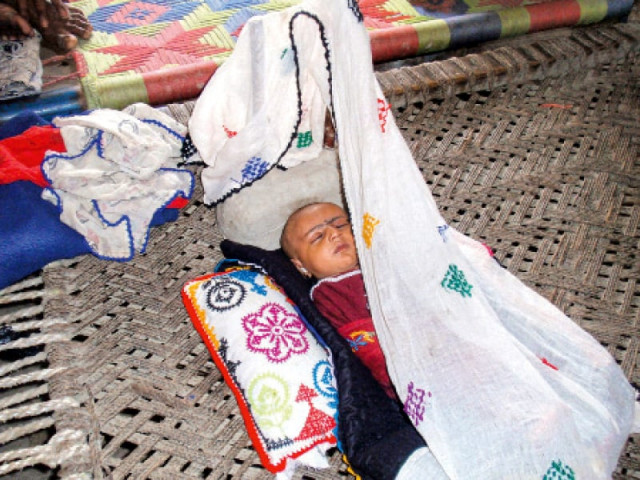We’re being treated like unwanted guests: relief camp’s residents
Shikarpur’s assistant commissioner said that relief bags will be distributed soon.

We’re being treated like unwanted guests: relief camp’s residents
When the rain first thrummed the roof of Mai Qaima Jatoi’s house in Roshan Abad village in Shikarpur, she simply shrugged it off. People in her neighbourhood were already talking about moving to safer ground, but she refused to budge. When the roof crumbled, so did her staunch belief that she was safe. Qaima immediately headed to the relief camp set up in Government High School No.1. Eight days later, she wonders if her life is better than it would have been had she stayed put.
Around 600 people are living at the camp. They share four toilets. Together, these two numbers sum up the camp’s sanitary conditions. A whole host of insects, including mosquitoes and flies, torment the camp’s residents, who are pleading for it to be sprayed with repellants. Some people complained that medicines are not available and that camp’s doctors are giving the same drugs to patients, regardless of the medical condition.
“We don’t want to live in this hell! We just want tents and a month’s worth of rations so that we can return to our villages,” Qaima told The Express Tribune angrily. “We know that the government will not drain water from our villages. We will just have to wait for it to evaporate.” She claimed that stale food is being served at the camp and because of this, many children there are suffering from gastroenteritis.
Rasti Jatoi, who came to the camp from Roidad Jatoi village near Chak, told The Express Tribune that plastic bags filled with cooked rice are being distributed to the flood-hit people. But the food is stale and the quantity is meager. “We’re victims of a natural calamity. We aren’t here for recreation. But the administration is treating us like unwanted guests,” said Jatoi. “When [politicians] need our votes, they visit our villages and meet each villager to muster support. Now, when we are in trouble, they are nowhere to be found,” she added bitterly.
Abdul Qadir Shaikh and his brother, Rasool Bux Shaikh, also headed to the camp after their houses in Khan Chand Abad, a low-lying locality of Shikarpur, were damaged during the downpour. “Between two and three feet of water is still stagnant in our area and nothing has been done to drain it,” said Abdul Qadir. He and his brother own a vegetable stand and are waiting for the water to be pumped so that they can earn a livelihood.
Dr Faiz Mohammad Magsi, who works at the camp, dismissed claims its residents were not being given proper medical care. “We have all the required medicines and patients are being treated very well.” He was quite miffed at the fact that the people were complaining, since he felt that they knew very little about diseases and their treatment.
Shikarpur’s assistant commissioner, Asim Qureshi, told The Express Tribune that food is being dispatched from one central point to the district’s camps. “People are never satisfied no matter what you do for them.” The assistant commissioner said that the victims will be given tents and rations so that they can go back to their villages.
Published in The Express Tribune, September 21st, 2012.

















COMMENTS
Comments are moderated and generally will be posted if they are on-topic and not abusive.
For more information, please see our Comments FAQ